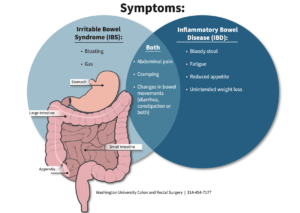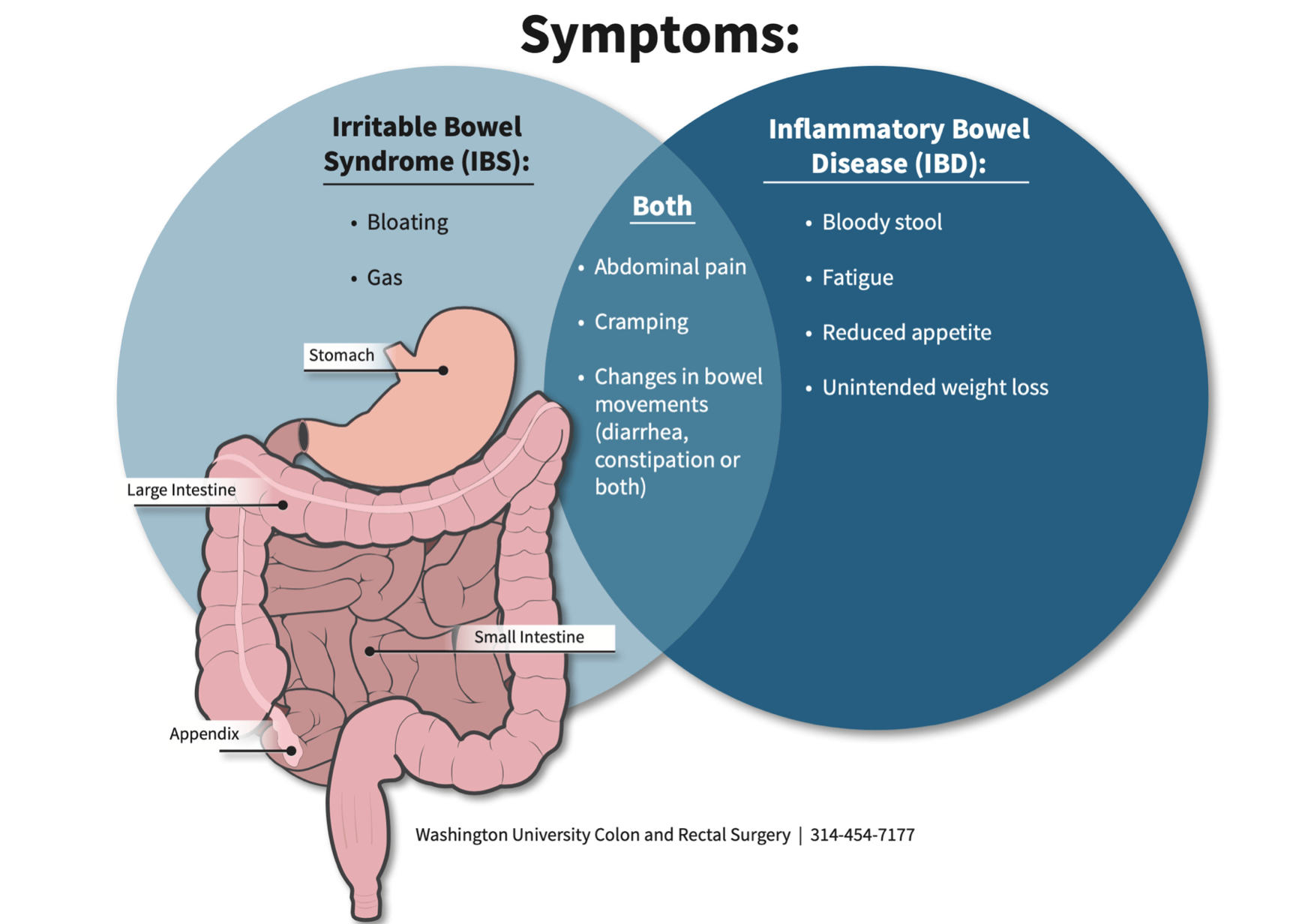Understanding Inflammatory Bowel Disease (IBD)
Inflammatory Bowel Disease is a chronic condition characterised by inflammation in the digestive tract. It commonly manifests as either Crohn’s disease or ulcerative colitis, both of which present with distinct symptoms and affect different areas of the digestive system. The most common symptoms are abdominal pain, diarrhea, fatigue, weight loss and reduced quality of life.
Crohn’s disease can affect any part of the GI tract, from the mouth to the anus, and it often causes inflammation in patches.
Ulcerative colitis, on the other hand, primarily affects the colon and rectum, leading to continuous inflammation.
Both Crohn’s disease and ulcerative colitis are characterised by periods of flare-ups, where symptoms such as abdominal pain, diarrhea, rectal bleeding, weight loss, fatigue, and reduced appetite may occur.
In some cases, IBD can also involve complications outside the digestive system, such as joint pain, skin problems, and eye inflammation.
IBD is a chronic condition with no known cure, and the exact causes are still not fully understood. It is thought to result from a combination of genetic predisposition, environmental factors, and an abnormal immune response that leads to chronic inflammation in the gut.
Is IBD the same as IBS?
While both conditions can cause digestive symptoms and impact quality of life, the key distinction lies in the presence of inflammation and structural changes in IBD, whereas IBS is characterised by functional disturbances in the gut. It is important to consult with healthcare professionals to obtain an accurate diagnosis and appropriate management strategies for these conditions.
whereas IBS is characterised by functional disturbances in the gut. It is important to consult with healthcare professionals to obtain an accurate diagnosis and appropriate management strategies for these conditions.
To read more about the differences of IBS and IBS click here to find out more.
Naturopathic Approaches to Managing IBD:
Naturopathic approaches that I can help you with can complement conventional care by focusing on holistic support and addressing underlying factors.
As a gut health naturopath specialist and someone who has struggled with “tummy issues” all my life. I have extensive knowledge and experience in addressing the underlying factors contributing to IBD.
I employ a holistic approach, focusing on personalised dietary plans, gut microbiome restoration, herbal medicine, nutritional supplements, stress management techniques, and lifestyle adjustments.
By working closely with me a gut health naturopath specialist, you can receive tailored guidance and support to manage your IBD symptoms, reduce inflammation, and promote healing in your digestive system.
My expertise, coupled with the possibility of Telehealth consultations, allows you to access their services conveniently, no matter where you are located.
Take control of your gut health and embark on a journey towards improved well-being with the assistance of a skilled naturopath specialist in gut health and IBD.
What you can do to improve IBD
1. Dietary Modifications:
– Identifying trigger foods and creating a personalised diet plan. This can be through an elimination diet or Food intolerance testing.
– Emphasizing anti-inflammatory foods such as fruits, vegetables, whole grains, and omega-3 fatty acids.
– Encouraging hydration and mindful eating practices.
2. Gut Health Support:
– Incorporating probiotics and prebiotics to restore and maintain a healthy gut microbiome.
– Recommending fermented foods like yogurt, sauerkraut, and kimchi.(For some people this makes things worse)
– Addressing food intolerances and supporting digestion with digestive enzymes.
3. Stress Management:
– Exploring stress reduction techniques like deep breathing exercises.
– Encouraging regular physical activity and promoting a healthy work-life balance.
– Offering guidance on relaxation techniques to manage stress triggers.
4. Herbal Remedies:
– Utilizing herbs with anti-inflammatory properties, such as turmeric, ginger, and Boswellia.
– Incorporating aloe vera, slippery elm, and marshmallow root for soothing the digestive tract.
– Creating personalised herbal formulas based on individual symptoms and needs.
5. Lifestyle Adjustments:
– Encouraging regular exercise to promote overall well-being and reduce inflammation.
– Promoting adequate sleep and establishing a healthy sleep routine.
– Advising against smoking and excessive alcohol consumption, as they can exacerbate symptoms.
6. Individualised Treatment Plans:
– Offering Telehealth consultations to provide personalized guidance and support for individuals with IBD.
– Clinic available for face-to-face consultations at Gosford or Gorokan.
– Collaborating with other healthcare professionals to ensure comprehensive care.
Disclaimer: The information provided in this blog is not a substitute for professional medical advice. Please consult a qualified healthcare practitioner for personalized recommendations and guidance.
